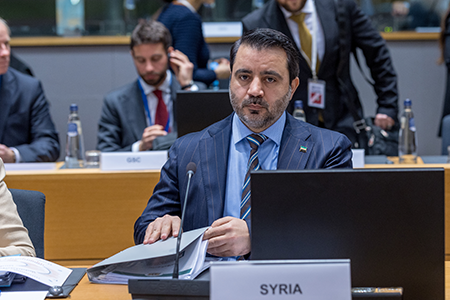“For half a century, ACA has been providing the world … with advocacy, analysis, and awareness on some of the most critical topics of international peace and security, including on how to achieve our common, shared goal of a world free of nuclear weapons.”
Syria Promises to Dismantle Chemical Weapons Program
April 2025
By Mina Rozei
Syria’s interim foreign minister called the Assad regime’s chemical weapons program “one of the darkest chapters” in world history and promised that the new government in Damascus will work to dismantle what is left, adhere to international norms, and ensure accountability for past wrongs.

Interim Foreign Minister Asaad al-Shibani made the commitments during a March 5 address to the Executive Council of the Organisation for the Prohibition of Chemical Weapons (OPCW) in The Hague.
It was the latest step in an international effort to reset relations with Syria after the ouster of President Bashar al-Assad in December and a civil war in which his regime used chemical weapons against domestic opponents and thwarted OPCW attempts to hold Syria to account.
“The new Syrian government … is determined to rebuild Syria’s future on a foundation of transparency, justice and cooperation with the international community,” Shibani said.
He said that although the Assad era chemical weapons program “is not our program .… our commitment is to dismantle whatever may be left from it, to put an end to this painful legacy, and ensure Syria becomes a nation aligned with international norms.”
However, Shibani said achieving that goal will be challenging because the program was top secret and many involved officials have fled, likely taking key documents with them. He also cited complications from Israel’s decision to conduct airstrikes in Syria after the regime fell.
“We lack the information, expertise, technical capacity, and human resources to fully assess and address any chemical weapons that may still exist,” he said.
Shibani addressed the executive council meeting after OPCW Director-General Fernando Arias held talks with interim president Ahmed al-Sharaa in Damascus in February. The OPCW presented a nine-point plan of action to assist with locating and destroying the remaining chemical weapons stockpile.
Shibani said the Syrian government began acting on the plan after the visit and identified a Foreign Ministry official to liaise with the OPCW on chemical weapons issues. The liaison already has met with the OPCW and Syria is working with the OPCW Technical Secretariat to plan further operational trips to Damascus in the near future, Shibani said. He credited the OPCW and its member states for documenting the chemical attacks perpetrated in Syria.
The foreign minister asked OPCW member states and the broader international community to provide information, coordination, technical assistance, capacity building, and other resources on the ground in Damascus and in The Hague. He also called for lifting economic sanctions on Syria to allow the OPCW to operate on the ground, stem the spread of criminal networks, and allow the war-torn country to recover economically.
Several OPCW member states supported Shibani’s appeal, stressing the “historic” opportunity to strengthen the norm against chemical weapons that the organization is now facing.
